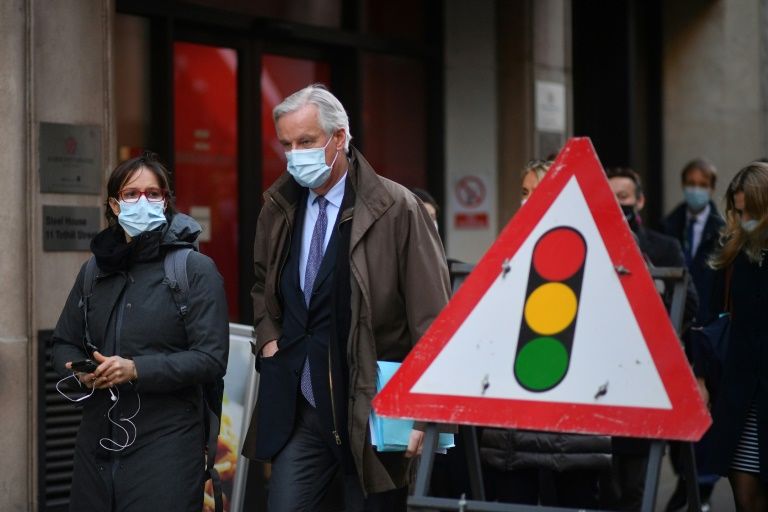Barnier says no guarantee of Brexit trade deal as talks grind on
Brussels (AFP) – Chief EU Brexit negotiator Michel Barnier warned Wednesday he can not guarantee he will strike a trade deal with Britain before the end of the year, but London insisted it was still optimistic.
After eight months of efforts, Barnier told diplomats the next days would be crucial, with some in Brussels saying talks could collapse and trade talks resume next year after Britain has spent time out in the cold.
“We are quickly approaching a make or break moment in the Brexit talks,” Barnier told a video meeting of European envoys, a diplomat said, in an account of the video talks confirmed by other sources.
“Intensive negotiations are continuing in London, but as of this morning it is still unclear whether negotiators can bridge the gaps on issues like level playing field, governance and fisheries,” Barnier said.
Diplomats said Barnier explained that the success or failure of the talks would be decided in the next few days, possibly late on Thursday or Friday.
Members of the European Parliament warn that they will need a legal text soon if they are to ratify it before December 31.
UK officials do not recognise a formal deadline, but privately agree the next few days could be crucial.
A top aide in London said Prime Minister Boris Johnson is “optimistic” about striking a deal but ready for Britain to move on without one.
“He is optimistic but he’s also always said that he is confident and comfortable that we would be OK without a deal,” Johnson’s press secretary Allegra Stratton told reporters.
Whatever happens in the talks, Britain will no longer be bound by EU single market rules after December 31 when a post-Brexit transition period comes to an end. The UK left the European Union on January 31.
The talks have blown through several deadlines and one European diplomat said there was “frustration” among the member state envoys that “for the moment, we’re still not there.”
“As of today we’re not able to say whether there will be an agreement or not,” the diplomat added.
Barnier’s briefing to envoys came after certain member states — notably France and the Netherlands — expressed concerns that the EU negotiation team was giving in too much to UK demands.
“This was mostly an exercise to calm nerves in Paris and elsewhere and to reassure member states that team Barnier will continue to defend core EU interests, including on fisheries,” a third diplomat said.
– Bridging the divide –
Barnier spoke to the EU27 officials by videolink from London, where he has been locked in intense talks with his UK counterpart David Frost and their teams.
A European source acknowledged that the member states were “wary and needed convincing.”
Failure to clinch a deal would cause deep economic disruption between the two sides at a time when the European economy is already deep in a downturn due to Covid-19.
The heart of the deal is for both sides to exchange trade with zero-tariffs or zero-quotas and maintain some of the close economic ties built during Britain’s 47-year EU membership.
The main source of discord is over how to establish a level of EU-UK alignment on health, labour and environment regulations, while also ensuring Britain’s newly found sovereignty.
The sides are also trying to draw up a penalty mechanism that would quickly kick in if either side breaks the terms of the deal.
Fishing, meanwhile, has become the most politically contentious issue, with a group of countries led by France and the Netherlands keen to keep easy access to British waters, but the UK wants tight limits.
Any deal would face ratification by EU member states as well as the British and European parliaments, a process that would begin after about two weeks of translation and legal scrutiny.
Barnier also briefed key MEPs on Wednesday who are highly reluctant to see their vote kicked to next year, possibly after the deal was implemented on a provisional basis.
“Swift progress is of the essence,” said German MEP David McAllister, after European parliamentarians had their own video meeting with Barnier. “Democratic scrutiny is not negotiable.”
Other observers — including a diplomatic source — said the EU and Britain could abandon the talks, suffer the economic shock and agree to quickly restart negotiations next year.
mt-fmi-jit-arp/adp
Disclaimer: Validity of the above story is for 7 Days from original date of publishing. Source: AFP.


